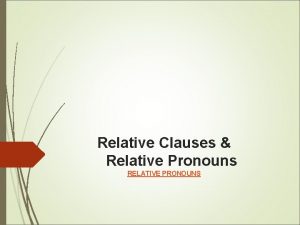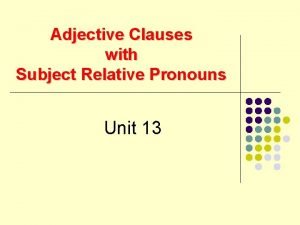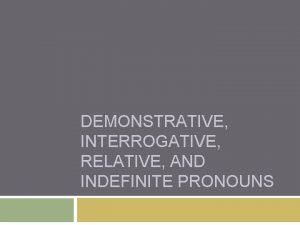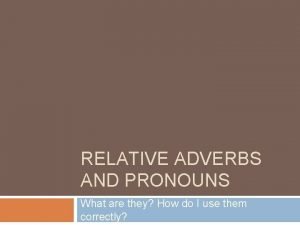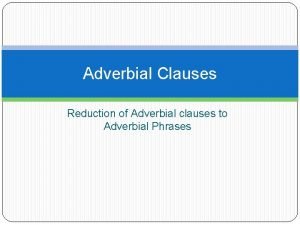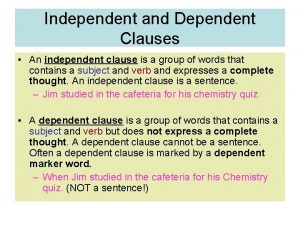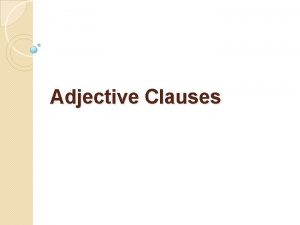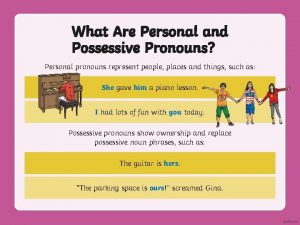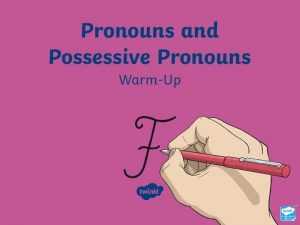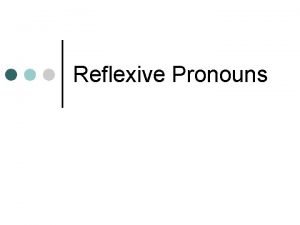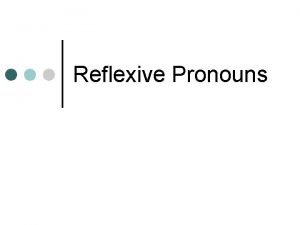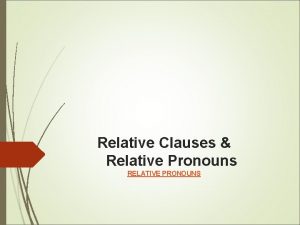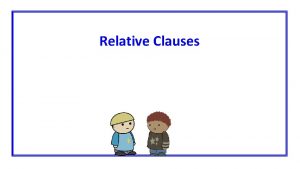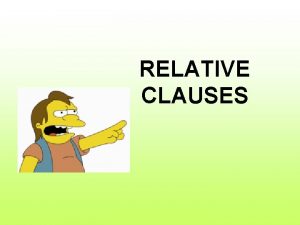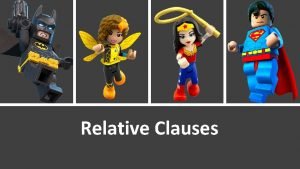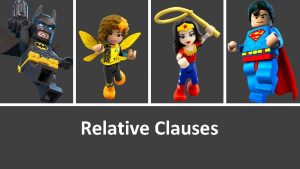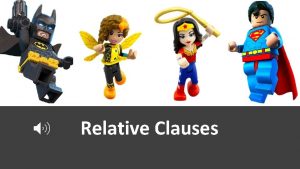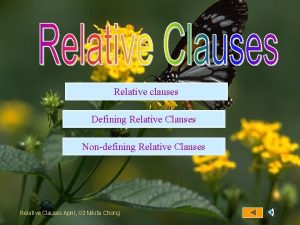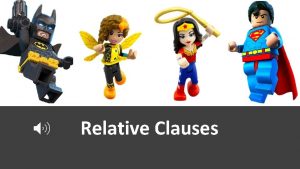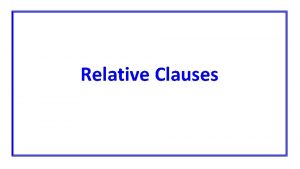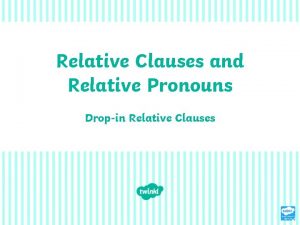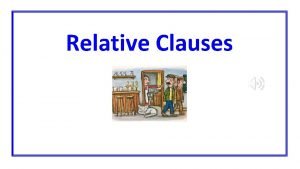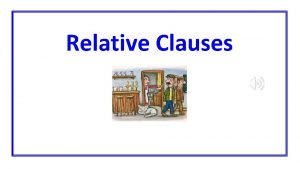Relative Clauses Relative Pronouns RELATIVE PRONOUNS RELATIVE CLAUSES
















- Slides: 16

Relative Clauses & Relative Pronouns RELATIVE PRONOUNS

RELATIVE CLAUSES: USE dependent clauses give additional information about something without starting another sentence by combining sentences with a relative clause, your text becomes more fluent and you can avoid repeating certain words Example: I like working with students who want to learn something. I downloaded a new film which is really interesting.

RELATIVE PRONOUNS introduce relative clauses relative clause tells us which person / thing the speaker means / refers to WHO (subject) PEOPLE WHOM (object) WHICH THINGS WHOSE (posession) THAT ----→ instead of WHO, WHOM, WHICH WHERE WHEN RELATIVE ADVERBS WHY: the reason why

Example: The students are smart. They are learning relative clause. The students who are learning relative clauses ‘who’ is used instead of ‘they’ are smart.

Remember: the pronoun refers to the same thing as the relative pronoun e. g. The girl is my sister. You saw her yesterday. A: The girl whom you saw her yesterday is my sister. → The girl whom you saw yesterday is my sister.

Relative adverbs WHY: THE REASON WHY I didn’t get a pay rise – that was the reason why I left. I didn’t get a pay rise – that was the reason (that) I left. WHERE The street where we used to play as kids is very busy now. WHEN He will never forget the day when he started working in that company.

TYPES OF RELATIVE CLAUSES Defining relative clauses give important information to identify the person or thing we are talking about. → We don’t use a comma. The office equipment (which / that) we bought was very expensive. The student (who/ that) I saw yesterday is from Spain. Non-defining relative clauses give additional information about the person or thing we are talking about. → We use a comma. Mr Jones, who is the CEO of the company, will retire soon. The Smiths, who live next door, have bought a new car.

RELATIVE CLAUSES DEFINING RELATIVE CLAUSES NON-DEFINING RELATIVE CLAUSES WHOM WHICH WHEN, WHERE THAT WHEN, WHERE DEFINING vs. NON-DEFINING CLAUSES SHORT WHO

DEFINING RELATIVE CLAUSES SUBJEC - The person who phoned me "that" is preferable T last night is my teacher. - The person that phoned me last night is my teacher. - The car which hit me was yellow. - The car that hit me was yellow. "that" is preferable

DEFINING RELATIVE CLAUSES OBJECT - The person whom I phoned last night is my teacher. - The people who I phoned last night are my teachers. - The person that I phoned last night is my teacher. - The person I phoned last night is my teacher. "whom" is correct but formal - The car which I drive is old. - The car that I drive is old. - The car I drive is old. "that" is preferable to "which" relative pronoun is optional

DEFINING RELATIVE CLAUSES POSSESSIV - The student whose phone just E rang should stand up. - Students whose parents are wealthy pay extra. - The police are looking for the car whose driver was masked. - The police are looking for the car of which the driver was masked. "whose" can be used with things "of which" is also possible

NON-DEFINING RELATIVE CLAUSE SUBJEC T - Mrs Pratt, who is very kind, is my teacher. - The car, which was a taxi, exploded. - The cars, which were taxis, exploded. OBJECT - Mrs Pratt, whom I like very much, "whom" is correct but is my teacher. formal - Mrs Pratt, who I like very much, is "who" is common in my teacher. spoken English and informal written English - The car, which I was driving at the time, suddenly caught fire.

NON-DEFINING RELATIVE CLAUSE POSSESSIV - My brother, whose phone you just heard, is a doctor. E - The car, whose driver jumped out just before the accident, was completely destroyed. - The car, the driver of which jumped out just before the accident, was completely destroyed. "whose" can be used with things "of which" is also possible

PREPOSITIONS + RELATIVE CLAUSES FORMAL STYLE: we usually put a preposition before the relative pronoun and we use whom instead of who The office to which Graham took us was filled with books. LESS FORMAL STYLE: we usually put the preposition at the end of the relative clause The office that Graham took us to was filled with books More examples: That’s the car for which I paid $2, 000. (more formal) That’s the car which / that I paid $2, 000 for. (more usual) That’s the car I paid $2, 000 for. (everyday English)

Review & exercises: DEFINING vs NON-DEFINING RELATIVE CLAUSES 15 sentences with key more exercises

Please scan the code and fill in the questionnaire:
 Relative clauses and relative pronouns stage 15
Relative clauses and relative pronouns stage 15 The person who phoned me last night is my teacher
The person who phoned me last night is my teacher Adjective clause with subject relative pronouns
Adjective clause with subject relative pronouns Restrictive adjective clause
Restrictive adjective clause Interrogative possessive pronoun
Interrogative possessive pronoun Demonstrative indefinite interrogative pronouns worksheet
Demonstrative indefinite interrogative pronouns worksheet Examples of relative adverbs
Examples of relative adverbs Adjective from t
Adjective from t Reduced adverbial clauses
Reduced adverbial clauses Independent clauses
Independent clauses Adjective clause markers
Adjective clause markers Reciprocal pronouns exercises
Reciprocal pronouns exercises Possessive personal pronouns
Possessive personal pronouns Match the possessive below
Match the possessive below Reflexive pronouns
Reflexive pronouns Reflexive pronouns definition
Reflexive pronouns definition Personal pronouns subject
Personal pronouns subject

